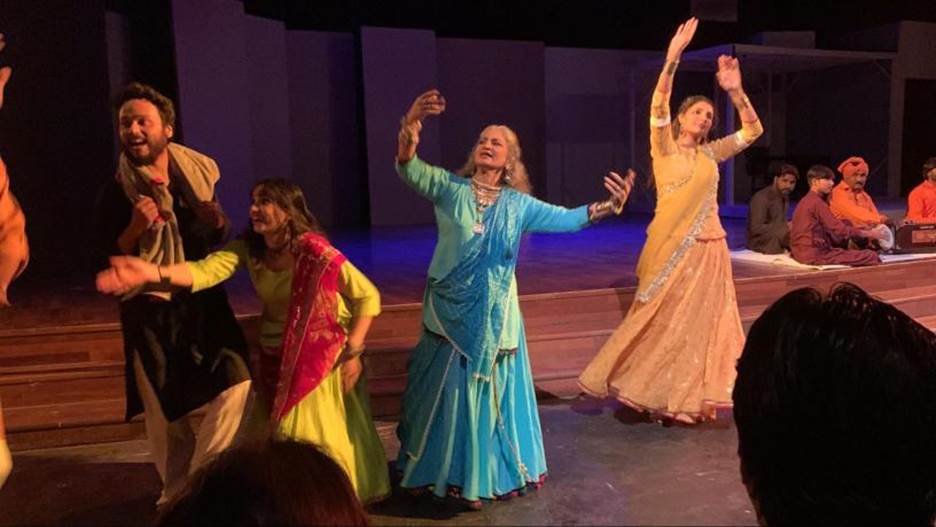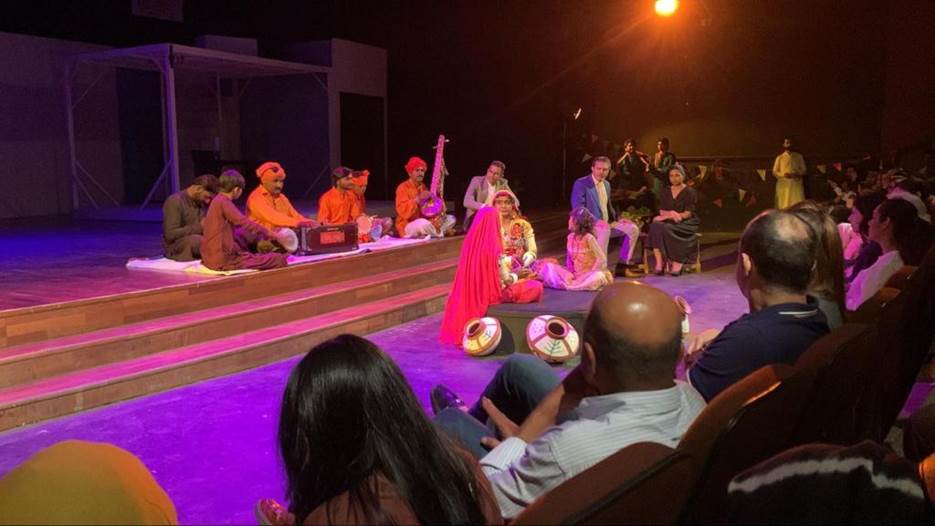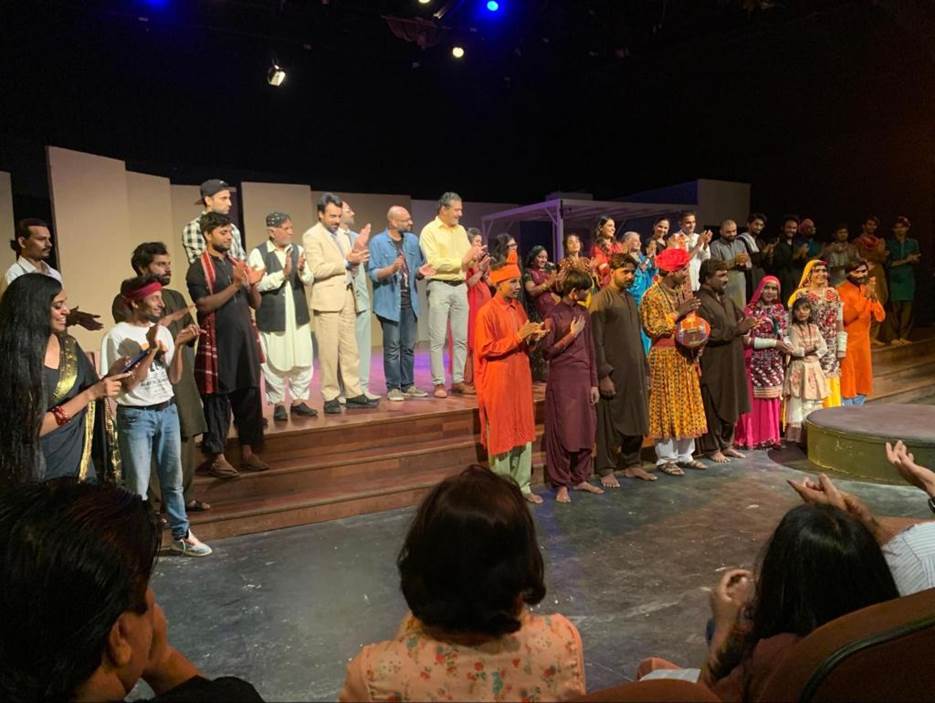

A play staged in Karachi drawn from the Sindhi classic Umar Marvi addressed the issues of capitalism versus climate justice, while highlighting the feudal mindsets and patriarchy that are endemic in most of South Asia
The Struggle for Life and Land in the Modern Rendition of an Ancient Sindhi Folk Tale
By Abdullah Zahid
Karachi, Pakistan
It’s a scenario familiar to indigenous peoples around the globe, particularly South Asia. Powerful groups of ‘developers’ descending upon rural settlements to coerce villagers into vacating their ancestral lands and make way for a housing scheme, a shopping mall or some other commercial enterprise.
The developers in The River’s Daughter, Pakistani musician Arieb Azhar’s debut play as a writer and producer, aim to build a golf course in the heartland of Sindh province. They offer rural inhabitants 10 lakh rupees (nearly US $ 3,500) per acre to relocate to the metropolis “for better prospects”.
They are thwarted by Marvi, a young, educated woman from the fisherfolk community. In a series of exchanges with the villagers and developers, she argues that selling the land would harm the ecosystem and local populace; it would lead to rampant deforestation, displace fauna, and contaminate the river.
Collaboration
In a dramatic turn of events, she produces a stay order from the court, forcing the developers to retreat. But the villagers – and the play’s audience – know that a battle may be won but the war is far from over.
“Nature is never destructive until it is being destroyed, and that’s why it’s crucial to acknowledge the role of women in preserving the environment,” director and dramatist Kulsoom Aftab told Sapan News in a post-premiere conversation. She believes that women bring valuable perspectives to areas like science, sociology and politics, given their nurturing sensibilities and empathy.
An acclaimed musician and creative producer of the award-winning documentary Indus Blues (2021), Arieb Azhar drew inspiration for The River’s Daughter from the legend of Umar and Marvi popularized by Sufi mystic Shah Abdul Latif Bhittai’s 18th century Sindhi classic Umar Marvi .
The blend of dance and traditional Sindhi folk music in the production is the result of Azhar’s deep ties with Pakistan’s vibrant folk music scene. The play features collaborations with Sindhi folk artist Mai Nimani and her troupe from Tando Adam, and musician Teekam Das who belong to the Marwari-speaking Bheel community of Cholistan, South Punjab. The duo brings an unparalleled depth and richness to the show through their mellifluous yet powerful voices and vocal range.
Marvi’s charismatic, defiant character and the forces she fought against centuries ago become a vehicle to explore the modern-day conflict between capitalism and climate justice.
A dedicated team at Karachi’s National Academy of Performing Arts (NAPA) worked with Azhar to translate and adapt the play from English to Urdu. Directed by Kulsoom Aftab, a member of NAPA’s first graduating class , the play was performed at NAPA’s Zia Mohyeddin Theatre.

A scene from the play The River’s Daughter - Photo Abdullah Zahid / Sapan News
The River’s Daughter addresses urgent contemporary concerns about environmental destruction caused by the unethical practices of developers and extractive industries – issues that are relevant not just to Pakistan but all of South Asia and beyond.
It also spotlights various connected issues like feudal elites exploiting their power to save their lands post-floods, destructive fishing nets, extinction of the Indus River’s blind dolphins, and the insidiousness of modern housing schemes.
Arieb Azhar aimed for the production to carry a universal message and “the need to explore a new path forward together” – one that incorporates entrepreneurship aimed at helping humanity, rather than driven by profit and greed, he told Sapan News.
Progress and preservation
The Islamabad-based media production All4ONE and Insaan Culture Club which promotes South Asian culture and progressive causes in the UK collaborated with Arieb Azhar and NAPA for the production. The British Council’s Gender Ecologies Grant played a crucial role in facilitating this collaboration.
At the heart of this play lies the battle between a young rural woman Marvi against the might of the powerful Bandobast Corporation. As a motherly figure to Marvi, Hakima Bibi – played by artist and feminist activist Sheema Kermani – embodies the spirit of the force that nurtures and sustains all life: water. In a flowing blue outfit, she performs a classical dance to honor the power and beauty of water.
As Marvi confronts her fears and wrestles with the gravity of her decision to prevent fellow villagers from giving up on their land, Hakima Bibi supports her views about the profound interdependence that binds her to the river and her community.
The play also highlights the destructive practice of trawling that captures smaller fish. Going against the state’s prohibition, one of the villagers in the play contends that this method is the sole way left for them to make ends meet. This situation sparks a discussion within the community, with Hakima Bibi proposing a shift towards traditional farming practices that prioritize sustainability for both the people and the environment.

Mai Nimani Troupe and Teekam Das - Photo Abdullah Zahid / Sapan News
Talking to Sapan News, Sheema Kermani narrates an incident from real life when Bahria Town , Pakistan’s largest real-estate company, began construction in Karachi about eight years ago and allegedly diverted the city’s water resources . Her feminist theatre company Tehrik-e-Niswan did a play in the area, addressing the issue of acquiring land “from the indigenous people without providing compensation.”
She also points to the way that vested interests who have built illegal apartments near Karachi’s urban Seaview beach, have for years in the name of progress “been pushing the sea back and reclaiming land.”
The greatest service theatre and performing arts can do is to raise a voice against injustices within society, she says. This can help transform mindsets.
“As a woman, I have to speak up more often,” says director Kulsoom Aftab with a determined smile. “But with a team of equally devoted male colleagues, we were able to keep things moving smoothly.”
Aftab acknowledges that the gender barriers still persist in the industry but emphasizes “persistence, resilience, and conviction” as essential qualities for success. “Sometimes a strategic silence and coming back with a bang can make all the difference, not just for an individual’s career but also for the greater good of the industry,” she says.
In her debut theatre performance, supermodel and actress Amna Ilyas played the lead character Marvi powerfully.
The supporting cast, mainly NAPA and Karachi Arts Council theatre graduates and students, bring unique perspectives to their roles, like Rao Jamal Singh Rajput as Chotu and Syed Qasim Shah as Sachal. After a long hiatus, actor Yaseen Bizengo makes a theatre comeback as Tota Saein’s manager – he has been a member of Dastak, the activist theatre group started by Arief Azhar’s late father Aslam Azhar . Theatre actor Fawad Khan (not the film star) plays the role of Umar, the director of the predatory Bandobast Corporation.
The play is peppered with meaningful dialogues. When Umar publicly offers Marvi a job in the development he has planned, she retorts: “ Tarraqi dharti baich kar agay barhne ka naam nahi, tarraqi dharti sambhal kar aagay barhne ka naam hai .” (Progress doesn’t mean selling out your land, real progress means protecting your land and the environment.)
In another scene, floods caused by torrential rain strike the Bandobast Corporation’s farmlands, requiring swift action. With the influence of local authorities, the Corporation opens the waterways towards Marvi’s village. This echoes what actually happened in Pakistan during the recent floods, when influential persons got water diverted to villages to save their own towns or farms.

Standing ovation for the cast and crew of The River’s Daughter - Photo Abdullah Zahid / Sapan News
There have been requests for the play to be performed in Lahore and Islamabad. Aftab plans to re-translate the play into English and organize readings in London this summer. She also hopes to take it into interior Sindh where people have experienced firsthand the struggles and triumphs depicted in the play.
(Abdullah Zahid is an aspiring journalist studying mass communication at the University of Karachi. Find him on Twitter @AbdullahZahid
Lead image: Sheema Kermani and Amna Ilyas with other performers in a scene from the play The River’s Daughter . Photo Abdullah Zahid / Sapan New s. This is a Sapan News syndicated feature .)

